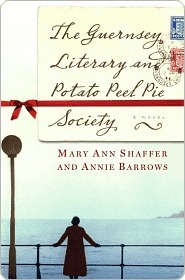REVIEW: The Guernsey Literary and Potato Peel Pie Society by Mary Ann Shaffer & Annie Barrows
 The Guernsey Literary and Potato Peel Pie Society
The Guernsey Literary and Potato Peel Pie Society
Mary Ann Shaffer & Annie Barrows
Kindle edition (borrowed from library)
Brief synopsis: It’s 1946 and World War II has just ended. Juliet Ashton wrote a column for a local newspaper to help people get through the War; making them chuckle (or even outright laugh) during a time that no one thought any happy emotions would survive. When Juliet is offered a 3-installment “article” for the paper about the effect reading has on people, she is stumped what to write about. Then she receives a letter in the mail from Dawsey Adams, a man from Guernsey who reached out to her when he found her name and address in a book he bought. From there they begin a correspondence and she learns much about him and his friends on the island. Moreover, she learns about their “literary society” and she discovers a strong and close-knit group of people who survived the Occupation. She travels to Guernsey to meet these people, wanting to learn more about them, and along the way learns more about herself.
What a charming and delightful cast of characters! All were so well written and full realized. I didn’t think any of them were flat. Witty and smart Juliet, shy and caring Dawsey, loopy and eccentric Isola, sweet and sincere little Kit, lovely Amelia and the rest of the cast were just terrific characters.
The book is written through letters, which can be difficult, but it works here. After reading this, I want a pen pal again! (I had one around the time I started high school. She was from Zimbabwe and we wrote back and forth for almost 5 years, sending each other little trinkets: pictures, puzzles, etc. I bet I still have all of her letters somewhere…
These people are so sincere and care a great deal for each other. The story can be quite humorous (I almost always had a little smile on my face when I read a letter from Isola, or a scene in which she appeared. For example, she got a book on phrenology and started “reading” the lumps and bumps on people’s heads. After reading Juliet’s head, she wrote a letter to Juliet’s dear friend – and publisher – and told him: “I told her it was a wonder she wasn’t married, with such great mounds.” – I don’t think she even realized what she was saying..) But there were also some very serious, and very sad parts (I won’t lie, I may have teared up in a few places), when talking about the Occupation and how it affected people: parents sending their children to England and being separated for 5 years, deaths, concentration camps, starving, being kicked out of their homes by the German soldiers.. the list could go on. Despite all of that against them, the members of the Literary Society persevered, stayed together and helped each other through this tough time when they had absolutely no contact with the world beyond their island.
Their Society introduced reading to an audience who hadn’t read books beyond school, or rarely did so. It brought them distraction in the best sense of the word. They learned to love certain stories, authors, genres and loved to talk and argue and discuss things with each other. People who had been merely neighbors became good, lifelong friends.
I wholeheartedly enjoyed this book and definitely recommend it. It’s a quick read (I think that’s due in part to the letter format but also because of the story). The ending is a bit predictable (maybe not how it gets there, though), but that didn’t take away from the story for me.
